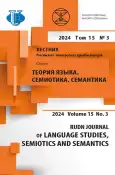Illocutionary Acts in EFL Teaching: Balancing Authority and Engagement
- 作者: Darong H.C.1
-
隶属关系:
- Universitas Katolik Indonesia Santu Paulus
- 期: 卷 15, 编号 3 (2024)
- 页面: 684-700
- 栏目: DISCURSIVE LINGUISTICS
- URL: https://journal-vniispk.ru/2313-2299/article/view/323580
- DOI: https://doi.org/10.22363/2313-2299-2024-15-3-684-700
- EDN: https://elibrary.ru/HKIFEB
- ID: 323580
如何引用文章
全文:
详细
This study investigates illocutionary acts in the context of English as a Foreign Language (EFL) education, focusing on their types and functions. The research centers on an EFL teacher as the subject and employs conversation analysis as the methodological approach. The primary aim is to explore how teachers utilize illocutionary acts to influence language learning experiences. The findings underscore the inherent authority of teachers in shaping classroom discourse and instructional interactions. Specifically, the study reveals that teachers predominantly exert influence through assertive acts, utilizing these to convey information effectively and provide instructional guidance. However, in an ideal classroom environment, there exists a harmonious balance of authority where teachers maintain instructional leadership while also empowering students to actively participate in their learning process. This balance fosters a collaborative atmosphere conducive to effective communication, mutual respect, and meaningful engagement in educational activities.
关键词
作者简介
Hieronimus Darong
Universitas Katolik Indonesia Santu Paulus
编辑信件的主要联系方式.
Email: hieronimusdarong@gmail.com
ORCID iD: 0000-0003-0050-0040
Scopus 作者 ID: 57214988933
Associate Professor
10, Jln. Ahmad Yani, Ruteng, Manggarai, Flores, Indonesia, 86518参考
- Darong, H.C. & Neldis, N. (2023). Investigating Illocutionary Acts in Video Podcasts and Its Pedagogical Implication in EFL Teaching. Interdisciplinary Journal of Education Research, 5 (June), 48-60. https://doi.org/10.38140/ijer-2023.vol5.05
- Oktaviani, A.D. & Alam, O.S.N. (2022). Illocutionary Speech Acts and Types of Hate Speech in Comments on @ Indraakenz’s Twitter Account. The Second International Conference on Communication, Language, Literature and Culture, 6(1), 91-99. https://doi.org/10.20961/ijsascs.v6i1.69943
- Putra, I.P.W.A. & Sedeng, I.N. (2022). Directive Illocutionary Acts Found in the Movies 21 and 22 Jump Street. Humanis: Journal of Arts and Humanities, 26(2), 180-187. DOI: https://doi.org/10.24843/JH.20 22.v26.i.02.p03
- Alhaded, H.H., Glushchenko, T.N. & Alhadid, H.H. (2022). Evaluative Language in Arabic Academic Discourse. RUDN Journal of Language Studies, Semiotics and Semantics, 13(1), 68-79. https://doi.org/10.22363/2313-2299-2022-13-1-68-79
- Cancino, M. (2015). Assessing Learning Opportunities in EFL Classroom Interaction : What Can Conversation Analysis Tell Us ? RELC Journal, 46(2), 115-129. https://doi.org/10.1177/0033688214568109
- Bardovi-harlig, K., Mossman, S. & Su, Y. (2017). The effect of corpus-based instruction on pragmatic routines. Language Learning & Technology, 21(3), 76-103.
- Taguchi, N., Xiao, F. & Li, S. (2016). Effects of Intercultural Competence and Social Contact on Speech Act Production in a Chinese Study Abroad Context. The Modern Language Journa, 100(4), 1-22. https://doi.org/10.1111/modl.12349
- Ziashahabi, S., Jabbari, A.A. & Razmi, M.H. (2020). The Effect of Interventionist Instructions of English Conversational Implicatures on Iranian EFL Intermediate Level Learners’ Pragmatic Competence Development. Cogent Education, 7(1), 1-20. https://doi.org/10.1080/233118 6X.2020.1840008
- Darong, H.C. & Guna, S. (2023). Corrective feedback : Pragmatic exposures in EFL classroom interactions. International Journal of Education and Learning, 5(1), 14-22. https://doi.org/10.31763/ijele.v5i1.820
- Bahing, Emzir & Rafli, Z. (2018). English Speech Acts of Illocutionary Force in Class Interaction. Advances in Language and Literary Studies, 9(3), 113-119. https://doi.org/10.7575/aiac.alls.v.9n.3p.113
- Tanduk, R. (2023). Pragmatic Aspects of Speech Acts: a Cross-Linguistic Perspective. English Review: Journal of English Education, 11(3), 881-890. https://doi.org/10.25134/erjee.v11i3.8762
- Zulkiana, K., Iskandar & Abdullah. (2023). Illocutionary Acts in F. Scott Fitzgerald ’s Short Stories. Eliterate: Journal of English Linguistics and Literature Studies, 3(2), 14-26. https://ojs.unm.ac.id/Eliterate/article/view/46381
- Austin, J.L. (1962). How to Do Things with Words, Oxford, Oxford University Press.
- Bach, K. & Harnish, R. (1979). Linguistic Communication and Speech Acts. Cambridge: MIT Press.
- Azhari, A.S. & Priono, Nuriadi (2018). Speech Acts of Classroom Interaction. International Journal of Linguistics, Literature and Culture, 4(2), 24-45. URL: https://sloap.org/journals/index.php/ijllc/ (accessed: 15.08.2022).
- Sumedi, S.H. & Rovino, D. (2020). Speech Act Analysis of English Teacher Talk at SMP Negeri 1 Rangkasbitung. Journal of English Language and Culture, 10(2), 121-131. http://dx.doi.org/10.30813/jelc.v10i2.2142
- Denisenko, V.N., Yergazy, N. & Rybakov, M. (2023). Language Means of Expressing Politeness in the Context of Russian Business Communication. RUDN Journal of Language Studies, Semiotics and Semantics, 14(3), 575-594. https://doi.org/10.22363/2313-2299-2023-14-3-575-594
- Brown, E., Smith, R., & Johnson, K. (2022). The role of genre and topic in illocutionary acts in video podcasts. Journal of Discourse Analysis, 40(4), 567-582.
- Babaii, E., Parsazadeh, A. & Moradi, H. (2018). The question of power in language classes from a critical discourse analysis perspective Once a student, always a student ? Pragmatics and Society, 8(4), 542-570. https://doi.org/10.1075/ps.8.4.04bab
- Cantone, K.F. (2022). Language exposure in early bilingual and trilingual acquisition. International Journal of Multilingualism, 19(3), 402-417. https://doi.org/10.1080/14790718.2019.1703995
- Darong, H.C. (2022). Form and Function of Teacher’s Questioning Technique in English Foreign Language Classroom Interactions. Interdisciplinary Journal of Education Research, 4(2015), 87-95. https://doi.org/10.38140/ijer-2022.vol4.07
- Solem, M.S. (2016). Negotiating knowledge claims : Students’ assertions in classroom interactions. Discourse Studies, 18(6), 737-757. https://doi.org/10.1177/1461445616668072
- Whayuni, M., Arifin, M.B., & Lubis, I.S. (2019). An analysis of flouting maxims in La La Land movie. Literary Criticism Journal, 3(3), 384-392. https://doi.org/http://dx.doi.org/10.30872/ jbssb.v3i3.2212
- Iliadi, P.L. & Larina, T.A. (2017) Refusal Strategies in English and Russian. RUDN Journal of Lan-guage Studies, Semiotics and Semantics, 8(3), 531-542. doi: 10.22363/2313-2299-2017-8-3-531-542.
- Darong, H.C., Kadarisman, A.E. & Basthomi, Y. (2020). Teachers’ Politeness Markers in Request in Classroom Interactions. NOBEL: Journal of Literature and Language Teaching, 11(2), 217-233. https://doi.org/10.15642/nobel.2020.11.2.217-233
- Strelchuk, E.N. & Lepkova, A.S. (2024). Conceptualization of the Notion of Freedom in the Worldview of Foreign Students of Journalism. RUDN Journal of Language Studies, Semiotics and Semantics, 15(1), 92-106. https://doi.org/10.22363/2313-2299-2024-15-1-92-106
- Klimova, I.I. & Kozlovtseva, N.A. (2023). Language as an Instrument of Social Control and People Management. RUDN Journal of Language Studies, Semiotics and Semantics, 14(2), 402-417. https://doi.org/10.22363/2313-2299-2023-14-2-402-417
- Bakhtikireeva, U.M. & Valikova, O.A. (2022). “Language Keys”: Foreign Cultural Lexicon in the Translingual (Russophonic) Literary Text. RUDN Journal of Language Studies, Semiotics and Semantics, 13(1), 184-200. https://doi.org/10.22363/2313-2299-2022-13-1-184-200
补充文件









